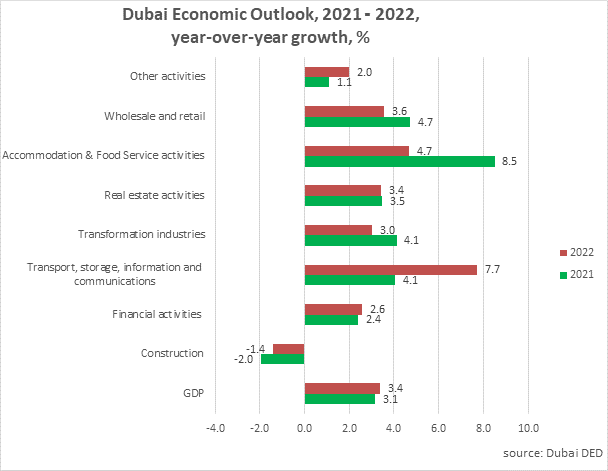
Dubai's economy is projected to record a growth of 3.1 per cent this year and 3.4 per cent in 2022.
That's according to the Department of Economic Development's (DED) latest economic outlook for the emirate.
His Highness Sheikh Hamdan bin Mohammed bin Rashid Al Maktoum, Dubai's Crown Prince and Chairman of the Executive Council said: "Dubai has successfully overcome the pandemic's global shockwaves."
He added that the bright outlook has been made possible by the vision and leadership of His Highness Sheikh Mohammed bin Rashid Al Maktoum, Vice-President and Prime Minister of the UAE and Ruler of Dubai.
Sheikh Hamdan highlighted how Dubai's position as a major economic capital has been supported by clear goals, flexibility and speed in responding to changes.
He also praised the emirate's emphasis on consistent legislative development and its efforts to create an attractive environment for investment.
Dubai has overcome the pandemic's global shockwaves, thanks to @HHShkMohd's directives & foresight. The city's economy is forecast to grow 3.1% this year, & 3.4% in 2022. Our vision for the future has embraced key global partnerships & the dynamic energy of our national talents.
— Hamdan bin Mohammed (@HamdanMohammed) September 21, 2021
"Dubai’s latest economic indicators show that the precautionary measures, comprehensive vaccination campaigns, stimulus packages, and legislative amendments that the UAE and Dubai have adopted were right on target," said Sami Al Qamzi, Director General of Dubai Economy.
He added that despite setbacks to the global economy from pandemic-related developments, Dubai witnessed between September 2020 and July 2021 a relatively faster recovery in sectors such as transport and tourism compared to other countries.
Expo 2020 is expected to provide a strong economy-wide boost, especially in the transport and tourism sectors.
The DED expects the accommodation and food services sector to grow by 8.5 per cent in 2021, compared to 2020, and transport, storage and communications by 4.1 per cent.
The wholesale and retail trade sector is also expected to regain a large part of its activity following the COVID-19-induced slowdown, achieving a growth of 4.7 per cent in 2021, while construction activity is likely to decline in 2021 by 2 per cent as a result of stabilization in the construction of residential, office, and hotel space, and a relative decline in construction related to infrastructure following their rapid growth recorded in the years before 2020.



 Nasdaq set to confirm bear market as Trump tariffs trigger recession fears
Nasdaq set to confirm bear market as Trump tariffs trigger recession fears
 Dana Gas and Crescent Petroleum exceed 500M boe in Khor Mor field
Dana Gas and Crescent Petroleum exceed 500M boe in Khor Mor field
 China to impose tariffs of 34% on all US goods
China to impose tariffs of 34% on all US goods
 Shares bruised, dollar crumbles as Trump tariffs stir recession fears
Shares bruised, dollar crumbles as Trump tariffs stir recession fears
 Wall Street futures sink as tariffs fuel recession fears
Wall Street futures sink as tariffs fuel recession fears




